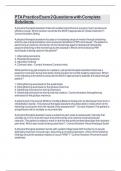Exam (elaborations)
PTA Practice Exam 2 Questions with Complete Solutions.
- Course
- Institution
PTA Practice Exam 2 Questions with Complete Solutions. A physical therapist assistant instructs a patient post thoracic surgery how to produce an effective cough. Which position would be the MOST appropriate to initiate treatment? - Correct Answers Sitting A physical therapist assistant focus...
[Show more]



